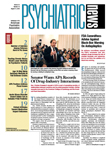Can acute stress disorder (ASD) predict posttraumatic stress disorder (PTSD)? Small studies have produced conflicting results. Now results of a larger study, conducted by Australian researchers, has sided with researchers who have found no predictive link.
It was headed by Richard Bryant, Ph.D., of the University of New South Wales. Results were published in the June Journal of Clinical Psychiatry.
Some 500 civilians admitted to four major trauma hospitals across Australia between April 2004 and April 2005 served as subjects in this study. Sixty-two percent had been admitted because of injury due to a motor-vehicle accident, 16 percent had been admitted because of injury due to a fall, 8 percent had been admitted because of injury due to an industrial accident, 5 percent had been admitted because of injury due to an assault, and the remaining 9 percent had been admitted for other reasons.
Within a month after the subjects' hospitalization, Bryant and his coworkers used DSM-IV criteria to determine how many of them were experiencing ASD. Thirty-three (6 percent) were. Three months later, Bryant and his coworkers used DSM-IV criteria to determine how many of them had PTSD. Forty-nine (10 percent) did. Bryant and his group then looked to see how many of the 49 patients who met PTSD criteria at the three-month follow-up assessment had had ASD within the month after their trauma. They found that 15 (31 percent) had.
Thus, “The majority of people who develop PTSD do not initially meet criteria for ASD,” Bryant and his team concluded. “These data challenge the proposition that the ASD diagnosis is an adequate tool to predict chronic PTSD.”
Nonetheless, Bryant and his coworkers did find that ASD's prognostic power tended to be somewhat stronger for subjects who had experienced a brain injury in conjunction with their trauma than for those who had not. Specifically, ASD predicted PTSD in 58 percent of this sub-group of subjects, versus 31 percent for the entire subject group. This particular finding may have relevance for the many Iraq War veterans whose PTSD is coupled with traumatic brain injury (Psychiatric News, March 2, 2007).
Also, since most of the subjects had been traumatized by accidental injuries, ASD might be more predictive of PTSD in patients whose trauma arises from other physical causes—say, from physical assault, sexual assault, or military combat—Bryant and his colleagues noted. Still, the rates of ASD and PTSD that they found in their subjects are similar to those that have been found in some other trauma populations, they pointed out. So their findings can probably be generalized to all trauma populations, they reasoned.
All told, since an ASD diagnosis appears to have only a limited ability to foretell PTSD, at least in persons who have been traumatized by accidental injuries, better tools than an ASD diagnosis are needed to determine which trauma victims are going to develop PTSD, Bryant and his group stated. For instance, preliminary evidence suggests that trauma patients' heart rates or moods in the wake of trauma might be good bellwethers of subsequent PTSD, they said.
The study was funded by Australia's National Health and Medical Research Council.
An abstract of “A Multisite Study of the Capacity of Acute Stress Disorder Diagnosis to Predict Posttraumatic Stress Disorder” is posted at<www.psychiatrist.com/abstracts/abstracts.asp?abstract=200806/060806.htm>.▪
